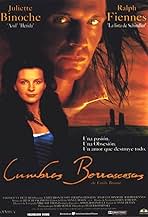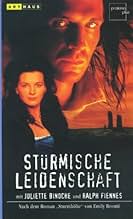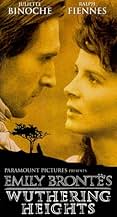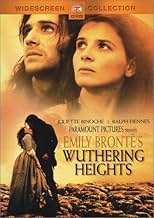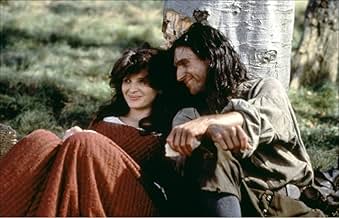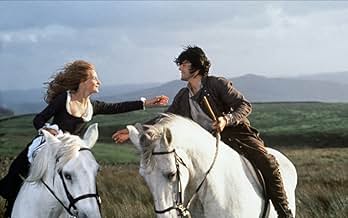AVALIAÇÃO DA IMDb
6,6/10
15 mil
SUA AVALIAÇÃO
Um homem fica obcecado com a vingança quando sua alma gêmea se casa com outro homem.Um homem fica obcecado com a vingança quando sua alma gêmea se casa com outro homem.Um homem fica obcecado com a vingança quando sua alma gêmea se casa com outro homem.
- Direção
- Roteiristas
- Artistas
- Prêmios
- 1 indicação no total
- Direção
- Roteiristas
- Elenco e equipe completos
- Produção, bilheteria e muito mais no IMDbPro
Avaliações em destaque
This is an unfairly maligned adaptation. True, if you judge it against more famous adaptations (e.g. the 1939 version), the first half of the film feels inadequate. However if you hold on in there, you'll get the second half of the book, revealing a plethora of themes Emily Bronte was exploring that are non-existent in the other films and revealing the novel's dark cruelty. Why previous adaptors chose to turn the film into a simple love story can be put down to sexism; had it been written by a man, the filmmakers would accept the brutal aspects of the book but of course a Victorian woman could never write such shocking things. For those who only know the story from previous adaptations or the brilliant Kate Bush song, it is a saga of hatred. Being rejected by his childhood love/adopted sister/soulmate Cathy Earnshaw (Juliette Binoche) when she chooses to marry prim Edgar Linton (Simon Shepard). Heathcliff vows vengeance on the Lintons by marrying Edgar's sister Isabella (Sophie Ward) and then also torturing Cathy and Edgar's daughter, Catherine Linton (Juliette Binoche- again!).
The film's mistake is that it is too tentative in the first half. Director Peter Kosminsky still wanted to give viewers the conventional love story that they knew and loved so he made the first half quite gentle in order to mitigate the darker second half. Unfortunately it means that Cathy and Heathcliff's relationship is not tempestuous enough. The famous declarations- "I AM Heathcliff", "I cannot live without my soul"- are spoken quietly and demurely.
Others have mentioned Binoche's excessive giggling, which doesn't convince me that she's seventeen but rather that she's under the influence. The criticisms of her accent is unfair; she has a clear French twang but it's hardly up there in the Hall of Bad Movie Accents. Fiennes' Yorkshire accent is far worse, sounding as if he'd learnt it through watching Postman Pat episodes. His initial niceness is overdone; Heathcliff is a gentle nature-loving soul who we cannot imagine why anyone would be so mean as to beat him as his adoptive brother Hindley (Jeremy Northam) does. Binoche is far too girlish as Cathy, who is essentially a tomboy and whose wild nature makes her identify with Heathcliff.
Things only really get going when Heathcliff returns, allowing Fiennes to drop the awful accent. Kosminsky keeps the novel's framed narrative, with tenant Mr Lockwood arriving at Wuthering Heights and meeting Heathcliff and Cathy II, who he mistakes to be Heathcliff's wife. If you are unfamiliar with the novel, it may be best to locate a family tree as a handy guide. Don't worry though; Emily Bronte meant the family tree to be messy and confusing. That is why I think the double-roling of Binoche as mother and daughter works. It shows how Heathcliff sees Cathy everywhere and adds a perverse sexual tension as well. Binoche is much better as the daughter and Fiennes is stronger as older Heathcliff.
One of the good things about the adaptation is its fidelity to the novel. Using much of the novel's original dialogue, we get a truer picture of Heathcliff's cruelty. It is hard to argue that Heathcliff isn't really that bad when he beats his wife, calls her an 'abject thing' and says she 'degenerates into a mere slut'. Fiennes refreshingly doesn't try to make Heathcliff sympathetic or gloss over his actions; rather he plays a torturer who is tired of tormenting yet unable to stop himself. Heathcliff could have left the second generation alone but instead he punishes them and plays with them like chess pieces.
Whilst I do like the perversely seductive evil of Fiennes' interpretation (his performance here is what got him the role of Amon Goth in Schindler's List), like Olivier he is a little too refined to play early Heathcliff. We can never really buy him as savage; in the book, he is characterised almost like a creature rather than a human. This is why to an extent readers pity him. However Fiennes' Heathcliff is suavely evil.
The inclusion of the second half of the novel is really what recommends this film and why fans of the novel should put it top of their list of adaptations to see. Bronte did not include the main characters' children to be cute or to drag out the story. It gives the story more impact, making the film a saga of one man's bitterness rather than a doomed love story. The film keeps the wonderfully atmospheric ending of the novel and shows through the second generation that the conflict may be resolved and that the things dividing Cathy and Heathcliff will not divide this second generation. Other film adaptations ignore this small ray of optimism and hence the novel is remembered as a big misery fest. First timers to the story may find themselves lost; Wuthering Heights is an odd tale even in the generic film adaptations. The relevance of the second half may not be instantly apparent to them and will certainly be confusing if they come to it with preconceptions of the story. However a re-watch brings new subtleties and nuances that aren't present in the other film adaptations (bar elements of the dreadfully dull 2011 version).
Ironically in order to see the true nature of the story, you have to watch two flawed films (1992 and 2011). One day someone will get it right- hopefully the 1992 film has opened up doors for future films to tackle both generations.
The film's mistake is that it is too tentative in the first half. Director Peter Kosminsky still wanted to give viewers the conventional love story that they knew and loved so he made the first half quite gentle in order to mitigate the darker second half. Unfortunately it means that Cathy and Heathcliff's relationship is not tempestuous enough. The famous declarations- "I AM Heathcliff", "I cannot live without my soul"- are spoken quietly and demurely.
Others have mentioned Binoche's excessive giggling, which doesn't convince me that she's seventeen but rather that she's under the influence. The criticisms of her accent is unfair; she has a clear French twang but it's hardly up there in the Hall of Bad Movie Accents. Fiennes' Yorkshire accent is far worse, sounding as if he'd learnt it through watching Postman Pat episodes. His initial niceness is overdone; Heathcliff is a gentle nature-loving soul who we cannot imagine why anyone would be so mean as to beat him as his adoptive brother Hindley (Jeremy Northam) does. Binoche is far too girlish as Cathy, who is essentially a tomboy and whose wild nature makes her identify with Heathcliff.
Things only really get going when Heathcliff returns, allowing Fiennes to drop the awful accent. Kosminsky keeps the novel's framed narrative, with tenant Mr Lockwood arriving at Wuthering Heights and meeting Heathcliff and Cathy II, who he mistakes to be Heathcliff's wife. If you are unfamiliar with the novel, it may be best to locate a family tree as a handy guide. Don't worry though; Emily Bronte meant the family tree to be messy and confusing. That is why I think the double-roling of Binoche as mother and daughter works. It shows how Heathcliff sees Cathy everywhere and adds a perverse sexual tension as well. Binoche is much better as the daughter and Fiennes is stronger as older Heathcliff.
One of the good things about the adaptation is its fidelity to the novel. Using much of the novel's original dialogue, we get a truer picture of Heathcliff's cruelty. It is hard to argue that Heathcliff isn't really that bad when he beats his wife, calls her an 'abject thing' and says she 'degenerates into a mere slut'. Fiennes refreshingly doesn't try to make Heathcliff sympathetic or gloss over his actions; rather he plays a torturer who is tired of tormenting yet unable to stop himself. Heathcliff could have left the second generation alone but instead he punishes them and plays with them like chess pieces.
Whilst I do like the perversely seductive evil of Fiennes' interpretation (his performance here is what got him the role of Amon Goth in Schindler's List), like Olivier he is a little too refined to play early Heathcliff. We can never really buy him as savage; in the book, he is characterised almost like a creature rather than a human. This is why to an extent readers pity him. However Fiennes' Heathcliff is suavely evil.
The inclusion of the second half of the novel is really what recommends this film and why fans of the novel should put it top of their list of adaptations to see. Bronte did not include the main characters' children to be cute or to drag out the story. It gives the story more impact, making the film a saga of one man's bitterness rather than a doomed love story. The film keeps the wonderfully atmospheric ending of the novel and shows through the second generation that the conflict may be resolved and that the things dividing Cathy and Heathcliff will not divide this second generation. Other film adaptations ignore this small ray of optimism and hence the novel is remembered as a big misery fest. First timers to the story may find themselves lost; Wuthering Heights is an odd tale even in the generic film adaptations. The relevance of the second half may not be instantly apparent to them and will certainly be confusing if they come to it with preconceptions of the story. However a re-watch brings new subtleties and nuances that aren't present in the other film adaptations (bar elements of the dreadfully dull 2011 version).
Ironically in order to see the true nature of the story, you have to watch two flawed films (1992 and 2011). One day someone will get it right- hopefully the 1992 film has opened up doors for future films to tackle both generations.
Only recently have I got round to reading the Emily Bronte classic of 1847 and, having finished it, I immediately wanted to view this 1992 British film version. It is a faithful adaptation in terms of both narrative and language but, although it is filmed in North Yorkshire, both Wuthering Heights and Thrushcross Grange are represented as much larger and grander than I had imagined them. One other criticism: the dance scene is not in the novel and is incongruous because the Grange does not do entertaining.
A notable strength of director Peter Kosminsky's work is its casting. The bewitchingly beautiful Juliette Binoche plays both Catherine Earnshaw and her daughter Cathy Linton and one can imagine why a man would go mad for love of such a woman. As the tormented and cruel Heathcliff, Ralph Fiennes is credibly dark.
Another great virtue of this film version is that, unlike many other movie adaptations of this enigmatic novel, it covers the whole story, rather than stopping at the death of Catherine. The novel is a long one covering three decades, so no film can depict all the incidents, but arguably the most pivotal scene is when Catherine declares her intention to marry Edgar Linton while confessing her love for Heathcliff and this scene is there in this movie.
A notable strength of director Peter Kosminsky's work is its casting. The bewitchingly beautiful Juliette Binoche plays both Catherine Earnshaw and her daughter Cathy Linton and one can imagine why a man would go mad for love of such a woman. As the tormented and cruel Heathcliff, Ralph Fiennes is credibly dark.
Another great virtue of this film version is that, unlike many other movie adaptations of this enigmatic novel, it covers the whole story, rather than stopping at the death of Catherine. The novel is a long one covering three decades, so no film can depict all the incidents, but arguably the most pivotal scene is when Catherine declares her intention to marry Edgar Linton while confessing her love for Heathcliff and this scene is there in this movie.
Famously, this portrays for the first time the whole of the story in the book, it is captivating and moves fast, and Fiennes deserves superlatives as the diabolical Heathcliff, menacing but with the eyes of a wounded animal.
There's something worthwhile here. That is the love story with love that was not consummated, not allowed to because they were from different worlds, because even though they connect in a deep way, the rules of the game say otherwise. Different times, but you can assume that it used to be so at Bronte's time, as it was later in Tolstoy's.
So they part, but they have grown roots so deep in each other, they cannot be parted, and distance only tears at them, distorts who they are, the distortion as memory. In the prisonworld Heathcliff creates in the end as punishing demigod of sorts, without which the story is incomplete, we can see the stark reflection of both the broader unjust world responsible for Heathcliff, and his private hell of vengeful recurring thoughts, both that stifle the soul.
All that is good enough in the film.
We get to puzzle about the name of Heathcliffe's adopted son being inscribed in a stone epigraph, on the door of a manor that was built centuries ago.
What isn't very satisfying is how we arrive at the story. The character who it is being narrated to, arrives at the manor, pores over books and images of Catherine, is captivated enough to dream of her, which leads to the housemaid's narration of the events. Instead of a dream, the visitor here sees Catherine's ghost, which sets a supernatural tone that is too obvious.
Too obvious because though even Bronte suggested ghosts, her main narrative gambit was layered dreaming, the notion that the hidden life of images and urges shapes the narrator's choosing of the story he tells about himself and things, some of which we externalize as destiny or demons, which is what we all do each time we remember, we dream of a story around a fictitious self.
But it's wonderful and moving as it is.
There's something worthwhile here. That is the love story with love that was not consummated, not allowed to because they were from different worlds, because even though they connect in a deep way, the rules of the game say otherwise. Different times, but you can assume that it used to be so at Bronte's time, as it was later in Tolstoy's.
So they part, but they have grown roots so deep in each other, they cannot be parted, and distance only tears at them, distorts who they are, the distortion as memory. In the prisonworld Heathcliff creates in the end as punishing demigod of sorts, without which the story is incomplete, we can see the stark reflection of both the broader unjust world responsible for Heathcliff, and his private hell of vengeful recurring thoughts, both that stifle the soul.
All that is good enough in the film.
We get to puzzle about the name of Heathcliffe's adopted son being inscribed in a stone epigraph, on the door of a manor that was built centuries ago.
What isn't very satisfying is how we arrive at the story. The character who it is being narrated to, arrives at the manor, pores over books and images of Catherine, is captivated enough to dream of her, which leads to the housemaid's narration of the events. Instead of a dream, the visitor here sees Catherine's ghost, which sets a supernatural tone that is too obvious.
Too obvious because though even Bronte suggested ghosts, her main narrative gambit was layered dreaming, the notion that the hidden life of images and urges shapes the narrator's choosing of the story he tells about himself and things, some of which we externalize as destiny or demons, which is what we all do each time we remember, we dream of a story around a fictitious self.
But it's wonderful and moving as it is.
SPOILERS Much has been made of this version of Emily Bronte's novel being the first cinematic version to be really faithful to her book. For once, we see the story continue after Cathy's death, and Heathcliff is shown to be truly villainous. More importantly ,this version gets across the fact that BOTH Heathcliff and Cathy are mean, selfish people who destroy themselves, each other and don't seem bothered about destroying others too. Ralph Fiennes is almost Bronte's character on screen, and skillfully maintains a bit of sympathy for Heathcliff even when he is committing the most dreadful of acts. Visually the film, filmed for once in Yorkshire, is terrific- bleak in an almost beautiful way, and a few scenes, such as the hand of Cathy's ghost in the window, are indeed excellently done.
However the film is seriously flawed by it's odd lack of emotion. There is a stiff, 'Merchant Ivory' feel to the film, completely wrong with a story as full of powerful, destructive emotions such as this. Only one scene, when Heathcliff cradles Cathy's body in her grave, really has any real power. Heathcliff's end and reunion with Cathy should be tearjerking, but is hardly moving at all. The attempt to include more of Bronte's plot is not too successful either, because many important scenes are rushed to keep the running time low. And there are some odd changes which do not work. What is the point of having Emily Bronte at the start and at the end, especially when Lockwood still narrates the main story? Why do Heathcliff and Cathy appear to have a sexual relationship, and right near the beginning? Why have Heathcliff beat up his wife? Yes, he mistreated her but having him as a wife batterer makes no sense, is he not bad enough already?
Still a reasonably worthy attempt than, but, in terms of cinema, the 1939 version is far superior.
However the film is seriously flawed by it's odd lack of emotion. There is a stiff, 'Merchant Ivory' feel to the film, completely wrong with a story as full of powerful, destructive emotions such as this. Only one scene, when Heathcliff cradles Cathy's body in her grave, really has any real power. Heathcliff's end and reunion with Cathy should be tearjerking, but is hardly moving at all. The attempt to include more of Bronte's plot is not too successful either, because many important scenes are rushed to keep the running time low. And there are some odd changes which do not work. What is the point of having Emily Bronte at the start and at the end, especially when Lockwood still narrates the main story? Why do Heathcliff and Cathy appear to have a sexual relationship, and right near the beginning? Why have Heathcliff beat up his wife? Yes, he mistreated her but having him as a wife batterer makes no sense, is he not bad enough already?
Still a reasonably worthy attempt than, but, in terms of cinema, the 1939 version is far superior.
10csmall
Having been fascinated by the Brontes for several years and growing up in Yorkshire, I've longed to see a faithful adaptation of Wuthering Heights for a long time. Why it's taken me so long to see this version I don't know!
I just watched this film tonight and I'm left shattered by it. It is stunning. It's probably a sacrilege to some to say that I thought the 1939 version with Laurence Olivier was awful, but there it is. That was saccharine and gave no hint as to the darkness of the original novel. This version, however, recaptures all that darkness and torment and shatters your soul with it.
Ralph Fiennes is an astonishing Heathcliff. Capable of tenderness but torn apart by what he can't have all for himself. The chemistry between him and Juliette Binoche is electrifying - Heathcliff and Cathy were born to be together and to see them almost forced apart by each of them failing to be true to their heart well.. it breaks YOUR heart. The poetic dialogue with Heathcliff and Cathy on the moors and the movie score complements this perfectly.
Supporting roles are also solid especially the actress who played Ellen Dean and an interesting cameo by Sinead O Connor as Emily Bronte! The only complaint I could make about this film is that it's not long enough! Years seem to fly by far too quickly and we barely get an insight into why Cathy and Heathcliff's souls are intertwined. However, what we DO see is stunning.
For me - 10/10.
I just watched this film tonight and I'm left shattered by it. It is stunning. It's probably a sacrilege to some to say that I thought the 1939 version with Laurence Olivier was awful, but there it is. That was saccharine and gave no hint as to the darkness of the original novel. This version, however, recaptures all that darkness and torment and shatters your soul with it.
Ralph Fiennes is an astonishing Heathcliff. Capable of tenderness but torn apart by what he can't have all for himself. The chemistry between him and Juliette Binoche is electrifying - Heathcliff and Cathy were born to be together and to see them almost forced apart by each of them failing to be true to their heart well.. it breaks YOUR heart. The poetic dialogue with Heathcliff and Cathy on the moors and the movie score complements this perfectly.
Supporting roles are also solid especially the actress who played Ellen Dean and an interesting cameo by Sinead O Connor as Emily Bronte! The only complaint I could make about this film is that it's not long enough! Years seem to fly by far too quickly and we barely get an insight into why Cathy and Heathcliff's souls are intertwined. However, what we DO see is stunning.
For me - 10/10.
Você sabia?
- CuriosidadesSinéad O'Connor makes an uncredited appearance as Emily Bronte.
- Citações
Heathcliff: I pray one prayer, I repeat it till my tongue stiffens. Catherine Earnshaw, may you not rest as long as I am living! You said I killed you, haunt me, then!... Be with me always, take any form, drive me mad, only do not leave me in this abyss, where I cannot find you!... I cannot live without my life. I cannot live without my soul.
- ConexõesFeatured in MsMojo: Top 10 Movie Couples Who Are Actually Toxic (2019)
Principais escolhas
Faça login para avaliar e ver a lista de recomendações personalizadas
- How long is Wuthering Heights?Fornecido pela Alexa
Detalhes
- Data de lançamento
- Países de origem
- Centrais de atendimento oficiais
- Idioma
- Também conhecido como
- Wuthering Heights
- Locações de filme
- East Riddlesden Hall, Bradford Road, Riddlesden, Keighley, Bradford, West Yorkshire, Inglaterra, Reino Unido(Heathcliff works in the carding shed)
- Empresa de produção
- Consulte mais créditos da empresa na IMDbPro
- Tempo de duração
- 1 h 45 min(105 min)
- Cor
- Proporção
- 1.85 : 1
Contribua para esta página
Sugerir uma alteração ou adicionar conteúdo ausente


